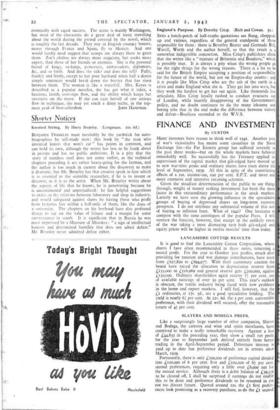Fiction
WRITING on the eve of a New Year, a fiction reviewer may be pardoned perhaps for a partial lapse from the particular to the general. Book buying is on the increase, but the book trade, in spite of its triumphant exclusion from the Purchase Tax, is still very heavily handicapped. Among the most serious of its diffi- culties is the increasing shortage of skilled labour in the various branches of industry whose combined efforts are needed before a book can be placed in our hands. On top of this is the acute shortage of essential materials, such as cloth, boards and paper. Readers can help by ceasing to demand from libraries and book- sellers novels that are long and new. For those that must have them, there are already plenty of long novels from earlier years on the shelves if length is the sole criterion. Publishers can help others and themselves by preferring quality to quantity. But most of all the novelist can help, for they are the worst culprits. We suggest as a New Year's war-time resolution: Don't pad to add!
In her first novel, Family from Vienna, Mrs. Buckley deals with the problems of International Jewry. She understands the tragic plight of the refugees fully, but her novel is written with a light touch (too light many people may think). Her principal characters have money and relations in this country. The story, which opens in London after the Anschluss, tells how the elderly Mrs. Delmonte, herself a Jewess of Austrian birth, dealt with the influx of fugitive relatives. Annushka. Delmonte is charming ; through her fears, doubts and bewilderment the author is able to give us a great deal of information about Jews and refugees and their problems in a fashion that will not harass unduly the most tender-hearted of readers, and through the minds of her daughter and grand-daughter the voices and needs of a younger generation are offered for our consideration and sympathy. Mrs. Buckley does not over-indulge in special pleading, nor does she endow her characters with too many virtues, so that they never become incredible. The book ends before the outbreak of war, so that, perhaps, we may expect a sequel. This novel may be recommended to the general reader.
Mr. Jordan has talent for simple narrative. In This Island Demands he writes of an adventurous voyage during the present war. The unfortunate Captain is saddled with a collection of rather " Kiplingitish " characters as passengers, and a drunkard for third mate. The ship is, in due course, attacked by Nazi sea- raiders. Mr. Jordan should be governet1 by his limitations, rather than his ambitions. The Captain, least loquacious of a talkative crew, is plausible on this occasion, which is more than can be said for the Oh So Tough Passengers, whose sentimentalities, when they are tucked away on a desert island for a whole month, are mawkish in the extreme. The ship is at length repaired and continues her journey; she is again attacked and this time pas- sengers and crew take to the boats. Mr. Jordan should check his tendency to overwrite, for often his effects are comic when they are meant to be striking.
Mrs. Keyes suffers even more from the same fault. All That Glitters is her ninth novel; it contains six hundred and forty pages and tells, with lavish descriptions of meals, clothes, houses, furnishings and ceremonies, of the lives and adventures of three rather bright young things. Chief of these American heroines is the beautiful and successful newspaper woman Zoe Wing, who does not make an appearance until page 37. She in due course marries the brother of one of the two minor heroines, a daughter of a senator. Since Mrs. Keyes' chief gift is exuberance, it may be as well to offer a sample of her style. The speaker, Robert Morton, is chief of her several heroes: " Come on now. Snap out of it! What do you say to coming down to the office with the old gent and me for a coupla hours? That's all there'll be left now, before we have to climb the hill to Cascara Castle."
Mrs. Morton, who had paid no attention to Helen's outburst, gave her son an annihilating glance which fell wide of its mark. He disregarded his Mother's departure from the scene, and went on patting his sister's shoulders. He was not an especially fine- fibred young man; he was inclined to wear loud clothes and use loud language and to keep loose company when he was out of bounds.
Fired by his beloved's example, he too becomes a journalist eventually with equal success. The scene is mainly Washington, but most of the characters do a great deal of hasty travelling about the world during the period covered by the novel, which is roughly the last decade. They stay in English country houses, motor through France and Spain, fly to Mexico. And one would hardly need suggest that scoops are always there to greet them. Zoe's clothes are always more exquisite, her cooks more expert, than those of her friends or enemies. She is the personal friend of kings, ex-kings, princesses, ambassadors, diplomats, &c., and so forth. And does she talk? and does she tell? Fully, frankly and freely, except to her poor husband when half a dozen simple sentences would break down the barrier that has risen between them. The woman is like a waterfall. Mrs. Keyes is described as a popular novelist, she has got what it takes, a luscious, lavish, over-ripe flow, and the ability which keeps her creatures on the move. If she can cure herself of one serious flaw in technique, she may yet reach a dizzy niche, in the top-



























 Previous page
Previous page